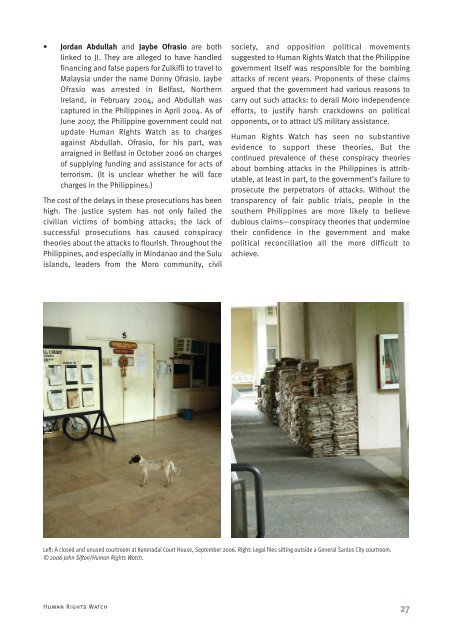Philippines Lives Destroyed - Human Rights Watch
Philippines Lives Destroyed - Human Rights Watch
Philippines Lives Destroyed - Human Rights Watch
Create successful ePaper yourself
Turn your PDF publications into a flip-book with our unique Google optimized e-Paper software.
• Jordan Abdullah and Jaybe Ofrasio are both<br />
linked to JI. They are alleged to have handled<br />
financing and false papers for Zulkifli to travel to<br />
Malaysia under the name Donny Ofrasio. Jaybe<br />
Ofrasio was arrested in Belfast, Northern<br />
Ireland, in February 2004, and Abdullah was<br />
captured in the <strong>Philippines</strong> in April 2004. As of<br />
June 2007, the Philippine government could not<br />
update <strong>Human</strong> <strong>Rights</strong> <strong>Watch</strong> as to charges<br />
against Abdullah. Ofrasio, for his part, was<br />
arraigned in Belfast in October 2006 on charges<br />
of supplying funding and assistance for acts of<br />
terrorism. (It is unclear whether he will face<br />
charges in the <strong>Philippines</strong>.)<br />
The cost of the delays in these prosecutions has been<br />
high. The justice system has not only failed the<br />
civilian victims of bombing attacks; the lack of<br />
successful prosecutions has caused conspiracy<br />
theories about the attacks to flourish. Throughout the<br />
<strong>Philippines</strong>, and especially in Mindanao and the Sulu<br />
islands, leaders from the Moro community, civil<br />
society, and opposition political movements<br />
suggested to <strong>Human</strong> <strong>Rights</strong> <strong>Watch</strong> that the Philippine<br />
government itself was responsible for the bombing<br />
attacks of recent years. Proponents of these claims<br />
argued that the government had various reasons to<br />
carry out such attacks: to derail Moro independence<br />
efforts, to justify harsh crackdowns on political<br />
opponents, or to attract US military assistance.<br />
<strong>Human</strong> <strong>Rights</strong> <strong>Watch</strong> has seen no substantive<br />
evidence to support these theories. But the<br />
continued prevalence of these conspiracy theories<br />
about bombing attacks in the <strong>Philippines</strong> is attributable,<br />
at least in part, to the government’s failure to<br />
prosecute the perpetrators of attacks. Without the<br />
transparency of fair public trials, people in the<br />
southern <strong>Philippines</strong> are more likely to believe<br />
dubious claims—conspiracy theories that undermine<br />
their confidence in the government and make<br />
political reconciliation all the more difficult to<br />
achieve.<br />
Left: A closed and unused courtroom at Koronadal Court House, September 2006. Right: Legal files sitting outside a General Santos City courtroom.<br />
© 2006 John Sifton/<strong>Human</strong> <strong>Rights</strong> <strong>Watch</strong>.<br />
<strong>Human</strong> <strong>Rights</strong> <strong>Watch</strong><br />
27

















